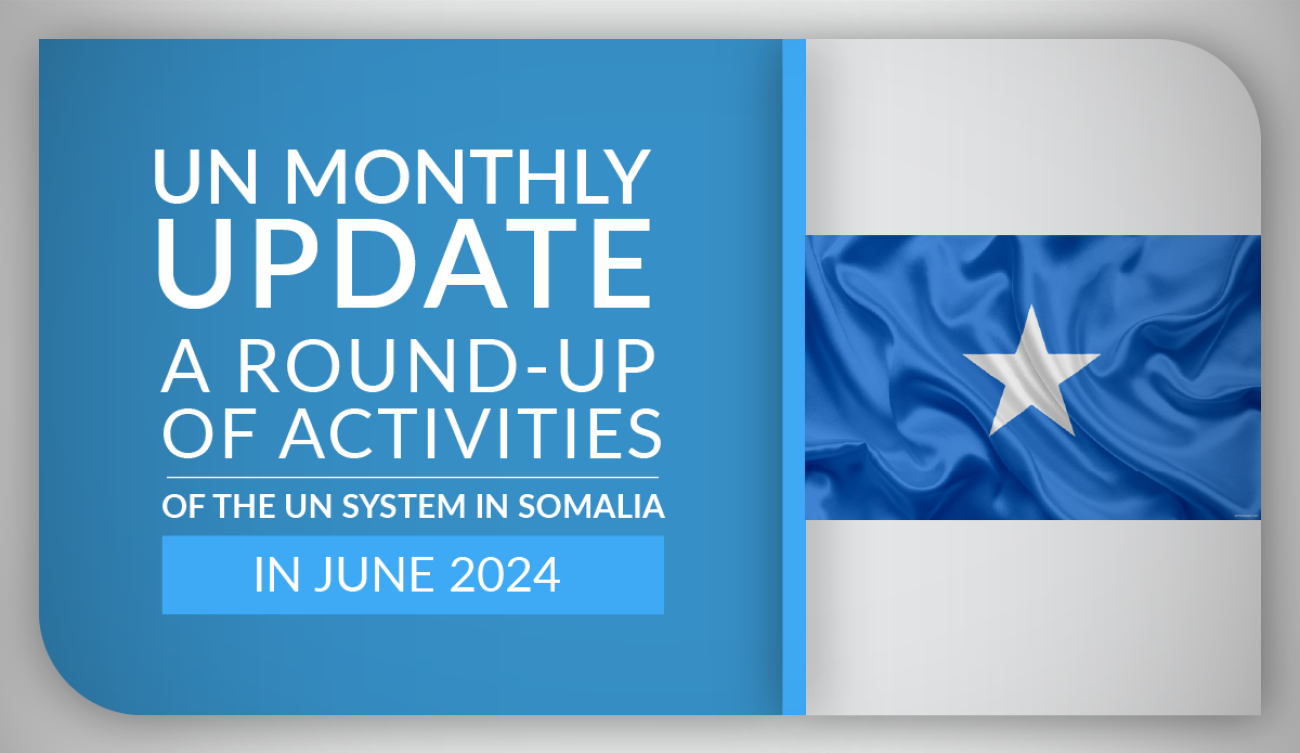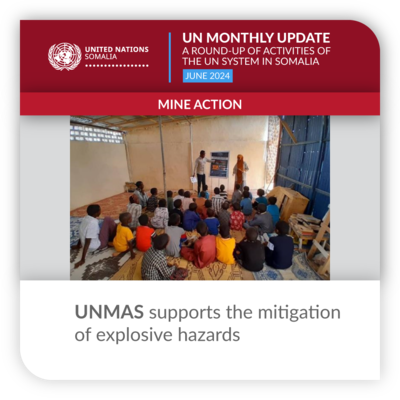A round-up of activities of the UN system in Somalia in June 2024

Highlights from some of the work of the UN Somalia in the month of June, 2024

Economic Development | UNIDO empowers business incubators to increase financial sustainability
UNIDO, with the support of the EU, organized a training session on financial sustainability and governance in Mogadishu. This event brought together a dynamic group of participants from local organisations such as SIMAD iLab, iRise Hub, and HarHub business incubators under the BIC Somali project. The training focused on enhancing skills in integrated reporting, innovation accounting, service blueprinting, and using artificial intelligence. These skills will increase financial resilience and strengthen innovation capacity.
UNIDO is committed to empowering local incubators, fostering robust economic growth, and driving sustainable development in Somalia. By equipping these business hubs with cutting-edge skills and knowledge, UNIDO is laying the groundwork for a more prosperous and innovative future for Somalia.

Education | UNICEF supports temporary learning centers
A new temporary learning center was set up in the camp for Internally Displaced Persons (IDPs) in Dhusamareb.
Hassan, one of the beneficiaries, had never been to school. In 2021, a prolonged drought forced his family to leave their home in the Bay region, southwest Somalia, and settle in the Arladi IDP camp in Dhusamareeb.
UNICEF, with support from the Government of Japan, is supporting 4,842 students in Galmudug State to access learning through temporary learning centers. There are 13 centers in South Galkayo, out of which 10 are located in IDP sites. The programme employs an Accelerated Basic Education approach, which features a compressed curriculum to enable children to catch up and be ready to enrol in the formal education system.

Housing | UN-Habitat hands over 200 permanent houses to Internally Displaced Persons
UN-Habitat handed over 200 permanent houses to Internally Displaced Persons (IDPs) in Baidoa during an event attended by the Pesident of the South West State, Abdiaziz Hassan Mohamed ‘Laftagareen.’
UN-Habitat facilitated securing the title deeds, which ensure land tenure security – vital for IDPs who are often at risk of eviction. This intervention promotes the right to decent housing and provides a durable solution towards the integration of IDPs with host communities.
The houses were constructed through an owner-driven approach, with some beneficiaries participating in the construction after receiving basic training that also equipped them with skills useful for future employment.

Women Empowerment | UNFPA's innovative approach to End FGM and harmful practices
UNFPA Somalia and the UNFPA Arab States Regional Office jointly launched the EmpowerHer Challenge on 9 June, in Mogadishu. The challenge aims to empower young Somali women to combat Female Genitial Mutilation (FGM) and Child, Early, and Forced Marriage by providing a platform for women-led innovation and social entrepreneurship.
Participants are provided with mentorship and training to refine their ideas and develop business plans. Only the most feasible and impactful proposals will receive funding and support to be implemented.
The EmpowerHer Innovation Challenge is more than just a competition. It is a powerful movement and catalyst for change, highlighting the resilience and potential of Somali women in their efforts to eliminate harmful practices and promote a more equitable society.

Mine Action | UNMAS supports the mitigation of explosive hazards
UNMAS has successfully completed the ‘Humanitarian mine action to promote peace and safety in Somalia’ project, which aimed to address the explosive hazard contamination in Galmudug State. This was achieved by providing non-technical survey and explosive ordnance risk education to conflict affected communities.
The project supported the Somali Explosive Management Authority to increase their ability to effectively coordinate humanitarian mine action interventions.
UNMAS continued to enhance the capacity of Somali Police Force (SPF) to mitigate the threat of conventional munitions and Improvised Explosive Devices (IEDs). This was done to protect the lives of internally displaced persons, returnees and communities that are living near the explosive hazard areas through the implementation of the three-year project - ‘Promoting security through enhancing the explosive disposal capacity of the SPF,’ which concluded earlier this year.

Security Council | UN Acting Special Representative briefs the Security Council’s meeting on the Situation in Somalia
The Acting Special Representative of the UN Secretary-General for Somalia and Head of the UN Assistance Mission for Somalia (UNSOM), James Swan, briefed the UN Security Council on Somalia on Monday, 24 June. He covered a range of topics including political development, regional stability, security situation, humanitarian issues, and women, peace and security. He also congratulated Somalia on its election as a member of the Security Council for 2025-2026, stating that this achievement demonstrated the progress Somalia has made over the past three decades in its journey from conflict to recovery.

Shelter | UNHCR constructs shelters in Dollow
Transitional shelters were handed over to Internally Displaced Persons (IDPs) at the Kaharey IDP site in Dollow with the help of UNHCR. This initiative aims to provide relief and support to those affected by climatic events in the region. These shelters provide a safe space for IDPs to rebuild their lives with dignity. The shelters are equipped with sturdy roofs, secure doors, and ventilation to provide comfort and protection. This collaboration between local government, humanitarian partners, and community members shows unity and cooperation in addressing crises and improving the lives of those affected by displacement.

Disease Surveillance | WHO supports strengthening disease surveillance
WHO-supported Integrated Disease Surveillance and Response system (IDSR) improves the efficiency and effectiveness of health information systems. IDSR data are hosted on DHIS2 - an open-source software platform used nationally to collate district health information. Health workers use this platform to record real-time information on health events and analyse data for early detection and prompt response to disease outbreaks.
Future plans include completing the final phase in 2024 to enhance public health surveillance by introducing community-level surveillance and improving laboratory capacities, supported by WHO's three-year plan.

Climate Action | FAO, Government and international partners launch the Jowhar Offstream Storage Programme (JOSP)
The Somali government, the Food and Agriculture Organization of the United Nations (FAO), and international partners launched the Jowhar Offstream Storage Programme (JOSP), a large-scale, transformative initiative that aims to build resilience and improve well-being for communities along the Shabelle river.
The initiative aims to benefit over 300,000 people with improved access to water for irrigation, reduce flood risks for 1.5 million people, mitigate drought impacts for 1.65 million people, increase local food production, and reduce humanitarian costs significantly.
The launch highlighted the need for a new approach to business that addresses both immediate and long-term needs to transform communities towards sustainable growth.
















